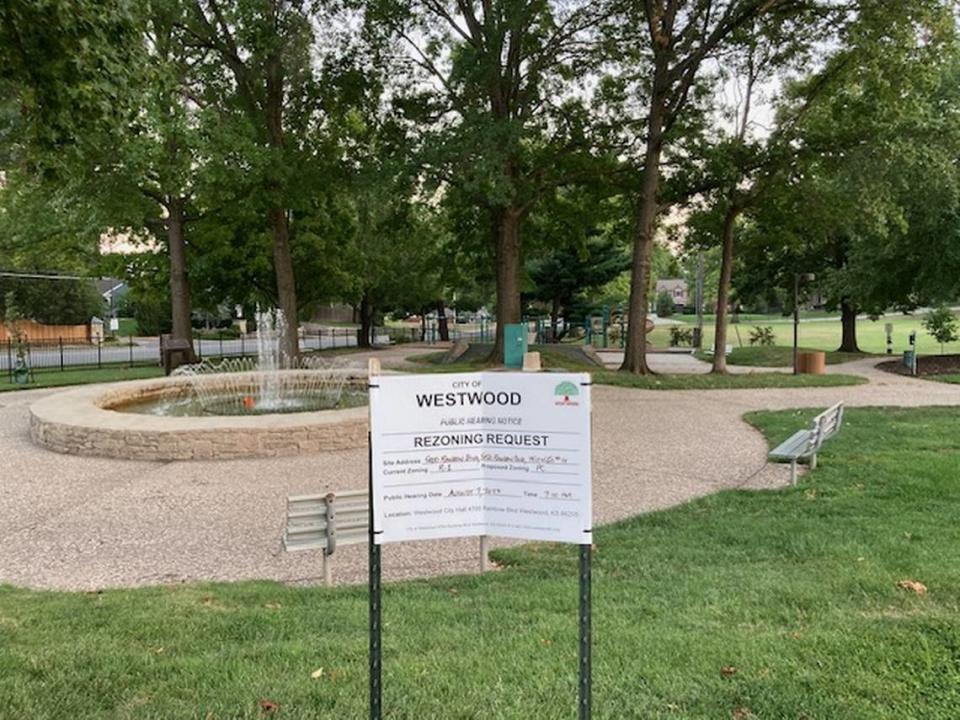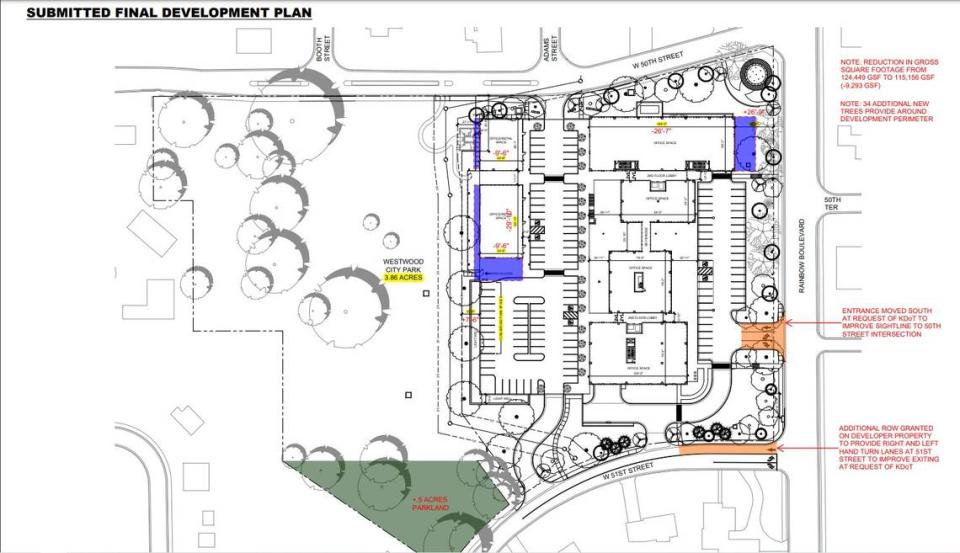Johnson County city threatens to sue its own residents who are fighting office complex
Reality Check is a Star series holding those in power to account and shining a light on their decisions. Have a suggestion for a future story? Email realitycheck@kcstar.com.
In the Johnson County suburb of Westwood, the saying “You can’t fight City Hall” might have an added caveat.
Residents are welcome to fight, but a few who have persisted in their attempt to block a four-building office and retail development received a letter from the Westwood city attorney threatening to sue them.
The result in Westwood, a sylvan town of 1,850 people just west of Kansas City, is that a small but resolute group of neighbors say they have been “cowed” and “bullied” into silence and, for some, anonymity in the press, out of fear of being sued by their local government.
Westwood’s mayor, David E. Waters, told The Star that the city’s threat of legal action came only in response to the residents’ own initial threat of litigation to challenge the development.
“As of today,” he said in an email, “no such legal actions have been taken by any parties in this matter, and it is certainly our hope and expectation that there will be none.”
The city’s threat, however, now has some residents exploring the possibility of suing the city, saying it suppressed their constitutional right to free speech.
“I, for one, am willing to speak out about this,” said resident Bernard Brown, himself an attorney.
“… I do not cotton to government officials threatening citizens with tort lawsuits just for speaking out and raising questions about how government is doing its job — just as good citizens should do. And I will not sit silent while this goes on. They can sue me and I’ll take that risk.”
One resident, who requested anonymity out of fear of litigation, called the city’s reaction to residents’ dissent “harassment.”
“I do think that there’s civil rights that are being violated,” she said. “And the irony, if it is irony, is that our public taxpayer dollars would be used to sue us. …You have this David and Goliath situation.”
Said a third, “I think the threats are outrageous. I cannot comprehend how a city government could possibly even think of threatening its constituents in any regard for any reason.”
In October, after months of debate, the Westwood City Council and mayor voted 5-1 to sell 7.6 acres of city land around 50th Street and Rainbow Boulevard, including the 1-acre Joe D. Dennis Park, to the Karbank Real Estate Co. so it can build the development.
In the deal, Karbank is to acquire not only the park land, but also 1.8 acres of adjacent empty city green space at 5050 Rainbow Blvd., once occupied by the Westwood Christian Church, and 4.8 acres of property at 3511 W. 50th St., where the former Westwood View Elementary School still stands. (The district built a new Westwood View school nearby last year.)
In return, Karbank, based in Mission Woods, has agreed to pay off a $275,000 debt that the city still owes on the church property, donate $2.65 million to the city so it can purchase the school building and its land from the Shawnee Mission School District, pay for the building’s demolition and grade the land for a new 3.9 acre park to replace Joe D. Dennis.
Numerous Westwood residents support the project, one city leaders see as improving the town’s amenities, adding offices and retail, and boosting the tax base while giving them a bigger park. The city recently announced a park planning steering committee to help select a designer.

But is it really a park?
As opponents to the development tell it, the current wrangle began on Oct. 12, several hours before the City Council approved the plan.
Through an attorney, Todd Hauser of Bushyhead LLC in Lee’s Summit, his clients — two unnamed residents, one from Westwood, and another living by the the park in nearby Westwood Hills — sent a letter to Waters suggesting that the vote be postponed. The letter said that based on Kansas law, statute 12-1301, if the city wanted to transfer park land, it must first publish the proposal in the official paper once each week for two weeks in a row. The city, the letter said, had failed to do that.
That night, the council nonetheless voted to rezone the land for the Karbank proposal.
A week later, on Oct. 19, Hauser sent a second later to Waters saying that he had “a brief discussion” with Westwood’s city attorney, Ryan Denk, who practices with MVP Law. He said he was told, in effect, that in 1969, when the title for the land that eventually became Joe D. Dennis Park was conveyed to the city, it was never technically identified for use as a city park, city funds weren’t used to buy it and a park tax levy was not used to support it. Thus, the Kansas law didn’t apply to Joe D. Dennis Park, he was told.
“It was their contention,” Hauser told The Star, “that it was not a city park.”
In his letter, Hauser included documents showing that, whatever the original title showed, the park was and is a city park. He included:
An October 1973 newspaper clipping of the park’s dedication; a 1973 park plaque designating the property as “Westwood Park”; a 2002 plaque designating the park as Joe D. Dennis Park, named for Dennis, a city mayor from 1965 to 1984; maps designating it as a city park; a city web page calling it a park; a tax assessment document calling it a park; also a Freedom of Information Act document sent to him this year by Westwood’s city attorney titled, “J15050-Tile Report 5000 Rainbow (Park Property).“
In the letter, Hauser asserted that because the city failed to publish the transfer of the park, as required under Kansas law, Westwood’s citizens now had the right to gather signatures on a petition to put the park transfer up for a citywide public vote.
“My client is not requesting an overturn of the rezoning of this parcel,” Hauser wrote, “but rather they are requiring the Mayor and City Council to follow their statutory duty. … Support the statutory right of the citizens of Westwood, Kansas, to petition for an election to decide if the sale, trade or exchange of Joe D. Dennis Park should happen.”
At the end of the letter, Hauser wrote, “If the City continues to refuse its statutory duty, my clients reserve the right to take all necessary steps, including legal action, to insure (the law) is followed.”
A month later, Denk fired back with a lengthy letter to Hauser saying that the claim that the city had not complied with the law was “without merit.”
“(T)he City,” he warned, “is prepared to take such legal action against you and/or your clients as may be necessary to protect its title and contractual relationships.”
Over the next 10 pages, Denk laid out a litany of legal arguments, beginning with the transfer of its title, as to why the Kansas statute did not apply to Joe D. Dennis Park.
He blasted Hauser for not revealing the names of his clients and whether they were from Westwood. As the letter concluded, he cautioned that Hauser’s clients’ “meritless” claims could interfere with it’s ability to meet its contractual obligations with Karbank.
“As such, please be advised,” Denk wrote, “that should you or your clients proceed further in this matter, the City reserves its rights to pursue legal claims against your clients for slander of title and tortious interference with the contractual relationships with the City.”
Later: “Accordingly, the City hereby demands that you and your clients immediately and formally withdraw any claims and demands related to K.S.A. 12-1301, and furthermore cease in publishing your and their continued slandering of the City’s title (whether through web sites, Facebook posts, door-to-door, or electioneering, as occurred in front of City Hall yesterday, during voting hours). …
“We hope that further action by the City will not be required in this matter, but your and your clients’ refusal to comply with the terms of this letter will leave the City with no other choice.”
The threat worked.

Residents ‘scared and cowed into silence’
Hauser responded, writing on Nov. 16 that Westwood could have simply said the Kansas law didn’t apply in this case, but instead “the Mayor and City Council directed their counsel to send a long-winded defensive dissertation demanding that our clients cease exercising their fundamental rights to freedom of speech.”
As one client told The Star, he felt “scared, and cowed into silence.” Lengthy litigation would cost too much.
“It was a thunderbolt,” the second client said. “I mean, I was just devastated. Basically to say that we were pursuing something that was unreasonable, and if we interfered with this process, our city would sue us.”
Waters told The Star that the city has been working on the Karbank proposal since March.
In that time, he said, city leaders had gone to great lengths to be transparent, listen to residents, and keep them informed, with weekly emails, newsletters, updates on its Facebook page, renderings shared at City Hall with a webpage dedicated to the proposal.
Leaders took several land use studies into account in coming to the decision to support the development. Multiple public hearings were held. Public input helped shape and improve the project, Waters said. The city accepted a protest petition from opponents, which required a supermajority of the City Council, 75%, to approve the rezoning.
“All resident feedback was welcomed and helpful,” Waters said, “and we daresay instrumental, in making the project the very best it could be. The City is excited that this project is moving forward.”
At the end of his letter, Hauser castigated the mayor and council for what he called “a disappointing approach to government.”
“In an era in which civil rights for all is a revered and celebrated topic,” Hauser wrote, “the Mayor and City Council chose to not engage in promoting the civil rights of their residents.”
He ended the letter informing the mayor and council that his clients would no longer pursue any legal action requiring the mayor and city council to “to perform their statutory duty under the law.”
“Their activities in this matter are concluded,” he said.
The city’s threat, other residents said, has already chilled the activities of others who had been gathering signatures on a petition in the hope of putting the land transfer up for a public vote.
“Unfortunately, the intimidation has already worked,” said still another resident, who also requested anonymity. “Three residents who have worked hard on this matter have already stepped away, afraid of being sued.”
Westwood’s sale of the properties to Karbank is set for Jan. 4.

